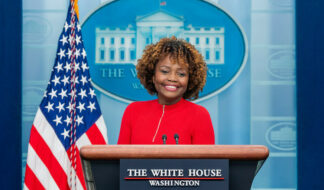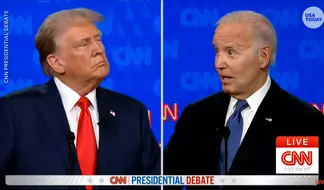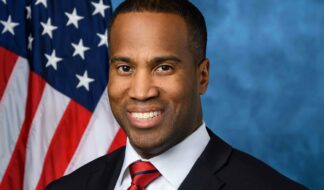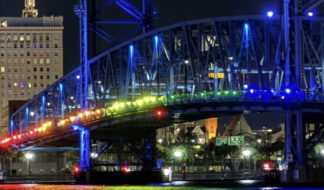By Abby Dees
Thinking Out Loud
No sooner had I written a column a few weeks back about how nice it felt to see a rainbow flag in front of Philadelphia's city hall, than I saw this headline from July (my online news alert tends to operate on Gay Standard Time): "Louisiana Republican to introduce bill to ban rainbow flag from public buildings." A little investigation revealed that Council member Andy Naquin, of Lafayette, LA, was looking into the feasibility of banning all but governmental flags from city property. A complaint from Ray Greene, 79, and fellow veterans, prompted this inquiry. According to city council meeting minutes, Mr. Green saw a photo of a rainbow flag aloft in Lafayette's Girard Park, and "it offended him very much." He told the council, "I am not a gay basher…this is a flag safety issue," and then, trying to illustrate his point, proffered two examples in which people had been prohibited from flying the American flag somewhere. The minutes do not indicate if anyone asked what that had to do with his rainbow flag problem.
I don't mean to bash Mr. Green either, nor do I take any issue with his devotion to the American flag. I would, however, like to use his complaint as an example of how our national discussions about LGBT pride avoid the simple truth.
Putting it all in context, the flag was hoisted for one day by local group Acadiana OUTspoken Alliance to celebrate the overturning of DOMA. Their president says that they got permission from the city and that the flagpole was not being used at the time. Council member Naquin told a local TV station that he was not intending to single out gays, but that he opposed any non-governmental flag going up there: "What would happen if the Catholics were to fly a flag or a pro-life flag was flown or KKK flag was flown or even Taliban flag was flown [sic]? Who would you say 'no' to when you open those doors?"
This all seems reasonable at first (though any high school civics student could tell you why no religious flags would be allowed). And it's true that as soon as the government starts cherry picking what kind of messages are allowed on public property, thorny free speech issues arise. A clean, across-the-board rule could possibly avoid this. But that's not what's got me gnashing my teeth.
I'm still stuck on why this issue arose at all, which is not so clean and tidy. Let's say that instead of a rainbow flag, the Boys and Girls Club asked to hoist a flag for a day. Would Mr. Green be so worried as to give an impassioned - though kind of random - speech on the imminent threat facing the red, white and blue? Of course not. While both gentlemen made obvious efforts to demonstrate that they had nothing against the gays, everything else they said belied these assertions. Speaking for the discomfited veterans, Council member Naquin said, "They felt it was a disrespect to this country and a disrespect to them and I'd have to agree with that."
I'm trying to find a way to interpret this that doesn't mean, "Gays are gross and I shouldn't have to watch them celebrating gayness in my park." What am I missing?
Mr. Green, less politically evasive than Naquin, got more to the point when he warned, "If you allow the gay pride flag to be flown, then you got to by all rights allow the KKK, the Muslims and anybody else" - which tells me exactly what he thinks of the KKK, Muslims, and yes, gays.
This is much less complicated than anyone is willing to admit. At its heart the debate isn't about the 1st Amendment, flag protection, or delicate local politics. If a rainbow flag on public property causes someone distress, it is because he or she fundamentally has a problem with LGBT people, a feeling anyone's entitled to. But any more explaining is merely tap-dancing around this fact. Fortunately, the furor in Lafayette has since died down and the city council is dealing with more important things now. Last I heard, there was an American flag in Girard Park.









